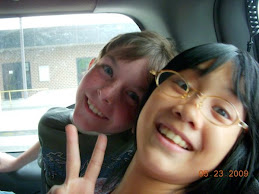“The longer this waiting goes on the deeper the ache”
Romans 1:8-12 (The Message)
I really related to this verse this morning when I read it! True, it is written by the Apostle Paul to the church in Rome, but it rings true for me as well.
The rest of the verse brought to mind this adoption journey as well:
“I so want to be there to deliver God's gift in person and watch you grow stronger right before my eyes! But don't think I'm not expecting to get something out of this, too! You have as much to give me as I do to you.”
When I started out down this road in was in some sense for a “selfish” reason. I love children and had longed for many years to adopt an orphan from another country. However, as I have learned more about adoption and orphanages I have truly come to see the “plight” of the orphans world wide. I’m waiting to adopt older children and there are so many that have so little hope of a family life and home. There is so much loneliness and lack of a bright future. I have noticed more than once the change of expression in the older children after they are brought home. It is as though, for the first time, they “belong”.
Of course I will “get something” out of adoption. Children! Children to love, to plan a future with, to laugh with and to cry with. But my children will also “get something” : Me (a mom), a dad, brothers and sisters, a family life, a future and a hope.
And lastly, I really look forward to sharing my faith with my children. To introduce them to God, if they have not met Him already. "To deliver God's gift in person and watch 'them' grow stronger right before my eyes!"
Thursday, January 25, 2007
Sunday, January 07, 2007
The Paula Zahn Now Show
A member of one of the yahoo groups I belong to sent us a link to CNNs Paula Zahn Now show from Friday. In it they were discussing China's new adoption requirements-including the new requirement banning fat people from adoptingfrom China. The discussion quickly degenerated to misguided opinions about adoption in America. The panelists were suggesting that the reasons Americans adopt from China is they think the children are "beautiful and intelligent" They also suggested that Americans don't adopt from Africa or Muslim countries due to prejudice. If you would like to read the complete transcript, you can see it here:
It made me mad, so I wrote a letter to give the facts. Here is the letter I wrote.
I am writing to express my disappointment with the January 5th Paula Zahn Now show. I found the segment on China adoption damaging to the public’s perception of adoptive families of Chinese children. Many of the statements of your panelists were not only degrading to adoptive families, they were also based on a lack of information about international adoption. The discussion was purportedly about the new regulations China has introduced, which, in the spirit of discussing discrimination, would have been a topic any non-expert could give an opinion about. However, the panelists made little effort to discuss that topic, and instead began making very misleading comments about adoption. I would like to share the facts, which conflict strongly with their statements.
Ms. Zahn insinuated that there was a preference for adopting Asian girls and little interest in adopting Black children from foster care. According to the US Census Bureau’s 2005 statistics, 16% of adopted children under 18 are black. This compares to only 7% of adopted children who are Asian. In addition, only 13% of US adoptions are foreign adoptions. Domestic adoptions far outweigh foreign adoption.
Mr. Martin and Ms. Maldonado suggested that families adopt from China because the children are perceived as “intelligent” and “beautiful”. This would not be the reason the majority of adoptive families would give. China adoption is popular because it is well regulated, predictable, and, as far as adoption goes, more affordable than many countries. In addition, China’s One Child policy means that there are many available children in China’s orphanages and they have little hope for a good quality of life unless they are adopted. Also, since there are many adoptive families in the states who adopt from China, there are support groups and other resources that help throughout the process and in raising the adopted child in a way that celebrates their cultural heritage. These resources are not as easily available for children from other cultural and ethnic groups.
Mr. Uygur implied that Americans are not adopting from Muslim countries due to prejudice. The true reason there are so few adoptions from Muslim countries is the difficulty. Out of 43 countries with a Muslim majority, in 13 countries adoptions are impossible due to Muslim Shari'a law, 3 countries require citizenship to allow adoption, 10 countries require residency periods ranging from 3 months to over 2 years, three of those also require adoptive parents to be Muslim and an additional 2 countries only adopt to Muslim parents. Of the 8 Muslim countries that have no strict requirements, only 2 have US agencies that they work with. Albania has only 2 licensed agencies and 22 children have been adopted from Albania in the past 2 years. Ethiopia is rapidly becoming a country of choice for adoptive families with 1,171 children being adopted from Ethiopia in the past 2 years. For more families to adopt from Muslim countries, adoption must be facilitated in the countries that allow it.
Mr. Uygur also suggested that Americans should be adopting orphans from Iraq. This quote is from the US Department of State:
“The Department of State has received many inquiries from American citizens concerned about the plight of the children of Iraq and wondering about the possibility of adopting them. At this time, it is not possible to adopt Iraqi children, for several reasons. In general, intercountry adoptions are private civil legal matters governed by the laws of the children's home country, which has the primary responsibility and jurisdiction for deciding what would be in the children's best interests. The U.S. Embassy in Baghdad has confirmed that Iraqi law does not currently permit full adoptions as they are generally understood in the United States.”
Mr. Uygur also implied that children who are equally deserving of home, such as children in Africa, are not being adopted, presumably due to the prejudice of adoptive families. Once again, this insinuation is contrary to the facts. African adoptions are on the rise. As of 2006, there were 3 African countries (Ethiopia was 5th, Liberia was 8th, and Nigeria was 19th) on the list available at the US Department of State website of the top 20 countries Americans adopt from. In the past 2 years, African adoptions have risen from 446 in 2004 to 688 in 2005 to 1147 in 2006. International adoption is not as simple as choosing a country and adopting a child. Each country has their own adoption requirements and not all of these are easy to meet. In addition, it is much easier to find an agency that provides services for China adoptions than for many other countries. Almost any agency that provides adoption services in multiple countries has a China adoption program. The number of agencies providing services for adoptions in African countries is much fewer. Nevertheless, as the number of agencies grows, so does the number of families who adopt.
Next time you invite panelists to comment on adoption, it would be helpful if they were aware of the many legal, cultural, and economic factors surrounding adoption before they drew conclusions hurtful to adoptive families across America. Perhaps a more constructive approach would be to increase awareness of and opportunities for international adoption outside of China, rather than demeaning families, who, with the best interest of their children at heart, have adopted form China.
Sincerely,
Annie
It made me mad, so I wrote a letter to give the facts. Here is the letter I wrote.
I am writing to express my disappointment with the January 5th Paula Zahn Now show. I found the segment on China adoption damaging to the public’s perception of adoptive families of Chinese children. Many of the statements of your panelists were not only degrading to adoptive families, they were also based on a lack of information about international adoption. The discussion was purportedly about the new regulations China has introduced, which, in the spirit of discussing discrimination, would have been a topic any non-expert could give an opinion about. However, the panelists made little effort to discuss that topic, and instead began making very misleading comments about adoption. I would like to share the facts, which conflict strongly with their statements.
Ms. Zahn insinuated that there was a preference for adopting Asian girls and little interest in adopting Black children from foster care. According to the US Census Bureau’s 2005 statistics, 16% of adopted children under 18 are black. This compares to only 7% of adopted children who are Asian. In addition, only 13% of US adoptions are foreign adoptions. Domestic adoptions far outweigh foreign adoption.
Mr. Martin and Ms. Maldonado suggested that families adopt from China because the children are perceived as “intelligent” and “beautiful”. This would not be the reason the majority of adoptive families would give. China adoption is popular because it is well regulated, predictable, and, as far as adoption goes, more affordable than many countries. In addition, China’s One Child policy means that there are many available children in China’s orphanages and they have little hope for a good quality of life unless they are adopted. Also, since there are many adoptive families in the states who adopt from China, there are support groups and other resources that help throughout the process and in raising the adopted child in a way that celebrates their cultural heritage. These resources are not as easily available for children from other cultural and ethnic groups.
Mr. Uygur implied that Americans are not adopting from Muslim countries due to prejudice. The true reason there are so few adoptions from Muslim countries is the difficulty. Out of 43 countries with a Muslim majority, in 13 countries adoptions are impossible due to Muslim Shari'a law, 3 countries require citizenship to allow adoption, 10 countries require residency periods ranging from 3 months to over 2 years, three of those also require adoptive parents to be Muslim and an additional 2 countries only adopt to Muslim parents. Of the 8 Muslim countries that have no strict requirements, only 2 have US agencies that they work with. Albania has only 2 licensed agencies and 22 children have been adopted from Albania in the past 2 years. Ethiopia is rapidly becoming a country of choice for adoptive families with 1,171 children being adopted from Ethiopia in the past 2 years. For more families to adopt from Muslim countries, adoption must be facilitated in the countries that allow it.
Mr. Uygur also suggested that Americans should be adopting orphans from Iraq. This quote is from the US Department of State:
“The Department of State has received many inquiries from American citizens concerned about the plight of the children of Iraq and wondering about the possibility of adopting them. At this time, it is not possible to adopt Iraqi children, for several reasons. In general, intercountry adoptions are private civil legal matters governed by the laws of the children's home country, which has the primary responsibility and jurisdiction for deciding what would be in the children's best interests. The U.S. Embassy in Baghdad has confirmed that Iraqi law does not currently permit full adoptions as they are generally understood in the United States.”
Mr. Uygur also implied that children who are equally deserving of home, such as children in Africa, are not being adopted, presumably due to the prejudice of adoptive families. Once again, this insinuation is contrary to the facts. African adoptions are on the rise. As of 2006, there were 3 African countries (Ethiopia was 5th, Liberia was 8th, and Nigeria was 19th) on the list available at the US Department of State website of the top 20 countries Americans adopt from. In the past 2 years, African adoptions have risen from 446 in 2004 to 688 in 2005 to 1147 in 2006. International adoption is not as simple as choosing a country and adopting a child. Each country has their own adoption requirements and not all of these are easy to meet. In addition, it is much easier to find an agency that provides services for China adoptions than for many other countries. Almost any agency that provides adoption services in multiple countries has a China adoption program. The number of agencies providing services for adoptions in African countries is much fewer. Nevertheless, as the number of agencies grows, so does the number of families who adopt.
Next time you invite panelists to comment on adoption, it would be helpful if they were aware of the many legal, cultural, and economic factors surrounding adoption before they drew conclusions hurtful to adoptive families across America. Perhaps a more constructive approach would be to increase awareness of and opportunities for international adoption outside of China, rather than demeaning families, who, with the best interest of their children at heart, have adopted form China.
Sincerely,
Annie
Subscribe to:
Posts (Atom)










